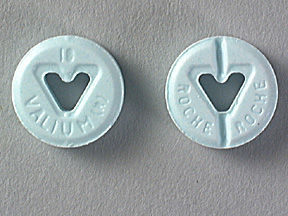Long-Term Effects of Valium Addiction
Valium, or diazepam, is a Schedule IV drug that is heavily regulated under the Controlled Substances Act of 1970. A benzodiazepine, Valium is often prescribed to patients who are diagnosed with issues of anxiety or panic because it can be helpful in slowing down the activity in the brain and allowing the patient to calm down when they are unable to do this naturally on their own.
With regular use, however, it is not uncommon for patients to develop a physical dependence upon the drug. Many patients find that they need larger and larger doses of Valium in order to manage their anxiety and stop the symptoms from becoming intrusive in their lives. This tolerance can mean that if a patient is without the drug for any reason or attempts to stop taking the pills, significant withdrawal symptoms can occur. Additionally, if physical dependence is paired with psychological dependence, or cravings for the medication, then Valium addiction becomes a diagnosis in addition to anxiety.
 The long-term effects of Valium can be devastating. There is almost no part of a person’s life that goes unharmed by chronic dependence upon the medication. If someone you love is living with an addiction to Valium, you will see them experience difficulties with:
The long-term effects of Valium can be devastating. There is almost no part of a person’s life that goes unharmed by chronic dependence upon the medication. If someone you love is living with an addiction to Valium, you will see them experience difficulties with:
- Physical health
- Mental health
- Relationships
- Finances
- Day-to-day quality of life
Overcoming these issues starts with receiving Valium addiction treatment that is comprehensive, addressing far more than just the physical dependency. If you would like to learn more about how we can help provide your loved one with intensive prescription drug treatment, contact us at The Orchid by calling the phone number listed above today.
Physical Effects of Valium Addiction
The physical and health effects of long-term Valium addiction are perhaps the most easily recognized by both the patient and those around her. While under the influence, your loved one will appear to be “out of it,” often nonresponsive or “zoned out.” Hand-eye coordination may be off, and slowed heart rate and breathing rate may be issues. In general, your family member may seem heavily sedated.
In some cases, side effects can occur:
- Central nervous system. A number of different function issues can develop, including slurred speech, confusion, tremors, vertigo and more.
- Cardiovascular system. This can mean extreme low blood pressure, which means that not enough blood is getting to the heart, brain, and other parts of the body.
- Gastrointestinal system. This can include stomach cramps, constipation, nausea, vomiting and other issues.
- Urogenital system. Some patients may experience a decreased sex drive, incontinence, and other problems.
Additionally, patients may have side effects like blurred vision, skin reactions, and dizziness while under the influence of Valium, especially at high doses, according to the National Highway Traffic Safety Administration.
Withdrawal Symptoms
Symptoms Include…
When patients are physically and psychologically dependent upon Valium, they can experience a number of negative health issues called withdrawal symptoms if they are without the drug or do not get a high enough dose for any reason. Psychologically, patients may experience:
- Depression
- Cravings for Valium
- Irritability
- Mood swings
- Anxiety
- Tension
- Confusion
Physically, patients will struggle with a slew of flu-like symptoms that are intense, including:
- Stomach cramps
- Muscle cramps
- Headaches
- Nausea and vomiting
- Heavy perspiration
- Insomnia
Some patients also experience hallucinations, seizures, hypersensitivity to physical contact or light, and a feeling of disconnection with the body or surroundings. The higher the dose and the longer the length of active Valium addiction, the more severe these symptoms will be and the more likely that the most intensive symptoms will occur.
Risks of Driving Under the Influence
Everyone from the drug manufacturer to researchers who published a study in the journal Anesthesiology say that driving while under the influence of Valium can be hazardous, an issue that is worsened with multiple doses. Patients are advised to avoid any hazardous occupation, including operating a vehicle, because complete mental acuity is necessary for optimum safety. The study showed that drivers under the influence of Valium experienced:
- An inability to stay in their lane
- Lower reaction time
- Inability to perform multiple tasks while driving (e.g., check mirrors, brake in a timely manner, use turn signals, check lanes, etc.)
- Less attention paid to the road and other cars
- Increased fatigue behind the wheel
When Valium was combined with alcohol – even a small amount of alcohol – impaired driving issues were even more significant.
Emotional Effects
 Patients who develop a dependence on Valium often report that they feel emotionally numb during this period. Their initial feelings of anxiety that resulted in their first Valium prescription may fade until they feel nothing at all – no joy, happiness, depression, or mood changes of any kind. During this period, patients may not be able to process significant and traumatic events that may occur in their lives. Their emotional growth stops, and all the feelings and emotions stack up. Facing them will be a part of stopping Valium use, and for many, continuing Valium addiction seems preferable to doing the hard emotional work that comes with this healing processing. The buildup of emotional issues can also be problematic in recovery as one of the steps in moving forward into sobriety is to work through emotionally uncomfortable issues that may trigger a relapse.
Patients who develop a dependence on Valium often report that they feel emotionally numb during this period. Their initial feelings of anxiety that resulted in their first Valium prescription may fade until they feel nothing at all – no joy, happiness, depression, or mood changes of any kind. During this period, patients may not be able to process significant and traumatic events that may occur in their lives. Their emotional growth stops, and all the feelings and emotions stack up. Facing them will be a part of stopping Valium use, and for many, continuing Valium addiction seems preferable to doing the hard emotional work that comes with this healing processing. The buildup of emotional issues can also be problematic in recovery as one of the steps in moving forward into sobriety is to work through emotionally uncomfortable issues that may trigger a relapse.
It is also possible for a wide range of psychiatric and emotional issues to occur in those who abuse Valium, including:
- Hyper stimulation
- Irritability or aggressiveness
- Hallucinations and delusions
- Psychosis
- Nightmares
Rebound Anxiety
According to the US National Library of Medicine, an issue called rebound anxiety may also be a result of long-term Valium abuse and addiction. This happens when the original symptoms of anxiety return when the patient attempts to stop using Valium or is without the medication for any length of time after long-term use.
Signs can include:
- Extreme changes in mood
- A return of heightened feelings of anxiety
- Restlessness
- Insomnia
- Panic attacks
Interpersonal Effects
 While living with an active dependence upon Valium, it is impossible to carry on a functional and healthy relationship with anyone – from family members to coworkers. Those living with addiction of any kind often find that they are unable to:
While living with an active dependence upon Valium, it is impossible to carry on a functional and healthy relationship with anyone – from family members to coworkers. Those living with addiction of any kind often find that they are unable to:
- Take part in meaningful conversations while under the influence
- Fulfill commitments and remember promises
- Be supportive of the needs of others
- Care for those who are dependent (e.g., children and elderly family members)
- Successfully communicate needs in a healthy manner
The result is a lack of meaningful relationships and often a handful of codependent or enabling relationships that only serve to fuel the Valium addiction. Because of these issues, many living with long-term Valium addiction will experience:
- An inability to maintain employment or successfully negotiate a career dealing with clients, customers, coworkers, group work and employers
- An inability to successfully complete coursework in school
- Divorce or breakup of a long-term relationship with a significant other
- Difficulties with maintaining child custody and positive relationships with children
- Issues with extended family members, neighbors and others in the community
- Loss of long-term friends who are unable to support or continue to watch the ongoing addiction
Part of recovery often includes working on rebuilding the broken trust and communication issues that characterize most relationships that remain in a patient’s life after long-term Valium addiction. Once repaired, these relationships can be a crucial component in the ongoing sobriety of the patient and provide them with the support they need to build a new life without prescription medications. Additionally, learning how to maintain a trusting and functional relationship can allow patients to build new relationships in sobriety that will help them to avoid relapse.
How Valium Addiction Treatment Can Help
When Valium addiction has been an issue for a long period of time, the process of recovery can be intricate and intense. Patients are advised to choose a rehabilitation program that offers them everything they need to heal on all the levels that were harmed by active addiction: physical, mental, emotional, and social. This will require a wide range of addiction treatment options and rehabilitation resources, including:
- Intensive evaluation and intake process to identify obstacles to recovery
- Medical detox and treatment
- Personalized treatment plans for each person’s needs
- Individualized and group therapy sessions each week
- Alternative and holistic treatments
- Involvement of close family members in therapy
- Long-term aftercare services and support
Studies show that a number of factors contribute to the efficacy of care and may be indicators as to whether or not the treatment program will be able to aid your loved one in learning the skills, including:
- Access to a number of different types of treatments and therapies in order to better tailor the treatment plan to the personality and needs of the patient
- Active engagement with treatment by the patient
- Low number of patients per treatment professional
- Length of stay – the longer in treatment, the better the outcome
- Ability of family members to learn how to best support their addicted loved one during treatment and afterward when they return home
If you’re ready to learn more about our comprehensive, evidence-based treatment program for Valium addiction and dependence upon other drugs and alcohol here at The Orchid, contact us now for more information.
